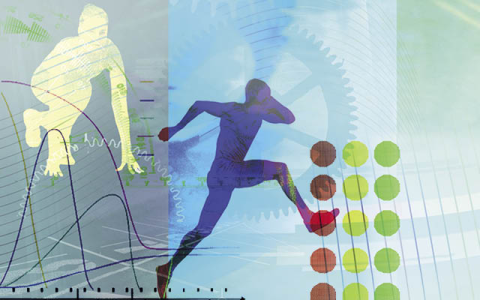
Some things are intuitively understood but until we have the science to back them we don't feel confident enough to try and manage them. This is one of them: Clutter and chaos saps our available energy making everything we do that little bit harder. This difficulty, let's call it friction, accumulates until we get to the point where we simply don't feel like doing anything.
Exercise, the need to maintain physical activity so our body and mind can maintain a healthy function for as long as possible, undeniably, requires energy. More than that it requires us to consciously choose to allocate energy towards that task.
We also need energy for the hundreds and even thousands of other conscious, subconscious and unconscious tasks we engage in. From dealing with clutter at home to dealing with the messiness of work and the unpredictability and friction of daily life. All of these things use the same basic energy unit that powers our muscles: adenosine triphosphate (ATP). Because our brain has evolved to direct attention at what we see, process it and generate the meaning required in order for us to do work (and live a life) the harder it is to discern what is important and what is not, the more energy it uses up even for the simplest tasks.
Consider, for a moment, how easy it is to find your car keys if you always know where they are because you leave them in the same place all the time. It's a task that requires next to zero thinking and barely any energy on your part. Now think what happens when on your way out to beat the traffic and get to work on time your car keys are not there. You frantically look for them trying desperately to remember where you put them. You ask every member of your household if they know and who moved them. Your heart rate goes up, cortisol levels spike in your bloodstream, you feel stressed. What should have been a simple task has now become a nightmare. Your brain runs all the catastrophic scenarios of hitting traffic, being late to work, having the disapproval of your coworkers, the list goes on. Even if you were to find your car keys a few seconds later your body is already in the grip of a neurochemical storm that has exhausted you before your day has properly started.
By the same token, fresh research, shows that a cluttered home environment, a life that lacks structure and general messiness in the way you operate contribute to stress, reduce your effectiveness and make it next to impossible to make good decisions. The exact opposite is achieved by structuring what you do.
Consider how this applies to your exercise choices now. The mood you started the day with is never going to be the same you end it with even if everything goes smoothly. You will be more tired and feel less inclined to do anything active. If, at the point of starting to exercise you need to then decide on what to do and how long to do it for and what to train the chances are that just all this will deplete your willingness to do anything.
If, on the other hand, you have already made it easy for yourself to exercise by having a ready spot, having picked the workout (or the program) and all you need to do is just show up, then the chances of you doing what you should increase exponentially.
Being smarter in what we do, the positive habits we create and the better decisions we make regarding our health and wellbeing sometimes requires just that: the removal of friction and obstacles from our path so we can do the bare minimum required. That bare minimum however, over time, delivers some astounding results.
As always this comes from a lot of new research from neuroscience and social psychology. I've linked to a few studies in the body of this post. But if you need to ask me anything about it don't hesitate. I hope this helps.
Last edited:
